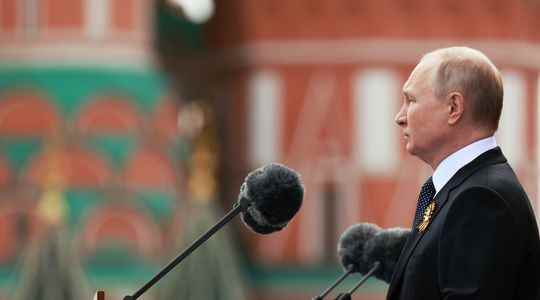Rarely has Vladimir Putin’s speech been so awaited in Russia, and with so much anguish. From his rostrum in Red Square, while his invasion of Ukraine is slipping, was the Russian president going to declare war and announce general mobilization, as Western observers and many Russians feared? For nearly two weeks, military experts and Kremlinologists have been torn on the issue, between unavoidable military necessity for some and irrational political suicide for others.
Finally, when the Russian president finished his May 9 speech commemorating the victory over Nazi Germany in 1945 before the thousands of soldiers in parade uniforms, lined up in serried ranks at the foot of Lenin’s mausoleum, the relief was palpable. Neither declaration of war, nor general mobilization, nor really sensational announcements; but one of those feverish historical logorrhea of which the Russian president has become accustomed, and which inscribe in the same historical continuity the conflicts of the Middle Ages, the Napoleonic wars, the world conflicts, the cold war and the invasion of Ukraine .
“The defense of the fatherland has always been a sacred duty,” Putin opens at the start of his speech. “From Minin and Pozharsky [héros de la guerre contre les Polonais au XVIIe siècle] in the Battle of Borodino, in the battles of Moscow, Leningrad, kyiv, Minsk, Stalingrad and Kursk, Sevastopol and Kharkov [batailles importantes de la Seconde Guerre mondiale]. Just like today, you are fighting for our people in the Donbass. For the security of our homeland Russia”.
“Russia countered the aggression in a preventive way”
With this speech, Putin formalizes and prolongs a recent trend in Russian propaganda: the inclusion of the “denazification of Ukraine” as an extension of a “great patriotic war” reinterpreted as a conflict between Russia and Westerners. It is, for example, the neologism “eurofascism” which settles in the official media to describe the Old Continent in 1941. It is also this poster campaign spotted in the streets of Moscow, which repaints Sweden as a country fascist with a lot of truncated and decontextualized quotes. It is this editorial published on May 5 on the website of the state news agency RIA Novosti, which asserts with the utmost seriousness: “All our ‘Western partners’ stripped themselves of their humanity and their civilization to reveal their profound Nazism. They are only continuing the work of their predecessors, who wanted to unify Europe within the Third Reich and colonize the Slavs. (…) Today, the descendants of European fascists bind EU countries in blood and war crimes. (…) What is this curse which makes that every century, Europe is transformed into an aggressive and Nazi mass? On May 9, 1945, we gave the world decades of peace and prosperity. It’s time to do it again.”
In this new narrative, the Second World War gradually becomes a war provoked by the West and directed against Russia. And it is to avoid its repetition that the “special military operation” is taking place in Ukraine. “We saw an open preparation for a murderous attack on the Donbass, for an invasion of our historical territories, including Crimea”, assures Putin from his rostrum. “kyiv wanted to acquire nuclear weapons. NATO was beginning to settle on our borders (…). Russia countered the aggression in a preventive way.”
“The regime no longer has any new levers to pull,” writes Andrei Kolesnikov, of the Carnegie Center in Moscow. “It is left with only one option: to equate what Russia is doing in Ukraine with the 1945 victory over Nazi Germany. That is why the Kremlin continues to claim that it is confronting manipulated neo-Nazis by the West and determined to destroy Russia. This is an absolute lie, but it is its only justification.” And to conclude, paraphrasing Karl Marx: “History repeats itself, the first time as a tragedy, the second time as a farce. But it ends up becoming an even greater tragedy.”
